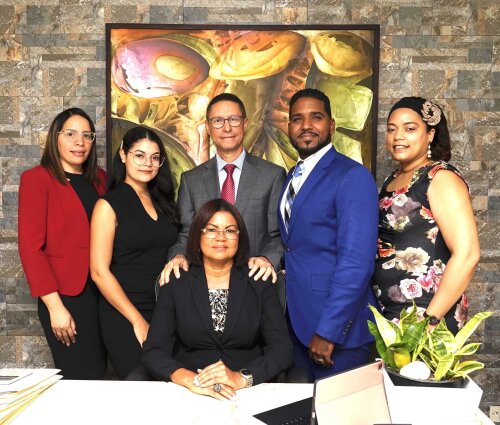Best Annulment Lawyers in Dominican Republic
Share your needs with us, get contacted by law firms.
Free. Takes 2 min.
Free Guide to Hiring a Family Lawyer
Or refine your search by selecting a city:
List of the best lawyers in Dominican Republic
About Annulment Law in Dominican Republic
Annulment in the Dominican Republic refers to the legal process of declaring a marriage null and void, as if it never legally existed. Unlike a divorce, which recognizes that a valid marriage has come to an end, an annulment asserts that the lawful requirements of marriage were not fulfilled. In the Dominican Republic, annulments are governed by specific legal criteria and grounds, upon which one can apply to have their marriage annulled. Common grounds include issues such as lack of consent, fraud, mental incapacity, or forced marriage.
Why You May Need a Lawyer
Navigating the annulment process can be complex due to its legal intricacies and the necessity of fulfilling specific criteria. Here are common situations where legal help is advised:
- Understanding Legal Grounds: A lawyer can help assess whether your situation qualifies for an annulment under Dominican law.
- Document Preparation: Compiling essential documents and evidence to support your case is crucial and a lawyer can guide you.
- Representation in Court: Attorneys can represent your interests in court and advocate on your behalf.
- Navigating Legal Procedures: Their expertise ensures compliance with legal protocols and expedites the process.
- Handling Disputes: If your spouse contests the annulment, legal advice is vital in negotiating or settling disputes.
Local Laws Overview
The Dominican Republic's annulment laws hinge on Civil Code provisions, defining various conditions under which a marriage can be declared void. Essential aspects include:
- Lack of Consent: If any party was incapable of consenting to the marriage due to mental incapacity or was underage.
- Fraud or Duress: Marriages induced by deceit or coercion fall under grounds for annulment.
- Impediment: Existing marriage ties, close kinship, or other legal barriers invalidating the marriage.
- Non-Observance of Formalities: Where legal formalities for the marriage were not followed, it stands voidable.
Frequently Asked Questions
What is the difference between annulment and divorce?
An annulment declares a marriage void as if it never existed, while a divorce dissolves a legally valid marriage.
What are the basic grounds for annulment in the Dominican Republic?
Grounds include lack of consent, underage marriage, fraud, duress, mental incapacity, and existing legal impediments.
How long does the annulment process take?
The annulment process duration can vary based on court schedules and the complexity of your case.
Do I have to appear in court for an annulment?
Yes, generally, you must appear in court. Your lawyer can assist and represent you in the legal proceedings.
Can I remarry immediately after an annulment?
Once the annulment is formally granted and finalized, you are free to remarry.
Will an annulment impact child custody or support?
An annulment doesn't typically affect custody or support, as these matters are handled separately under family law.
Can annulment affect property division?
Property acquired during the marriage may still be subject to division, dependent on specific circumstances and agreements.
How do I start the annulment process?
Consulting a lawyer is a crucial first step to evaluate your case and guide you through filing an annulment petition.
What documentation is needed for an annulment?
Essential documents include marriage certificate, identification, relevant evidence supporting annulment grounds, etc.
Can annulment decisions be appealed?
Yes, if you disagree with the court's decision, you can appeal through legal counsel within the stipulated timeframe.
Additional Resources
For further help, consult these resources:
- Government Offices: Local civil registry offices can provide guidance on formalities.
- Legal Aid Services: Organizations offering free or low-cost legal assistance.
- Public Libraries: Many contain legal information sections and resources on family and marriage law.
- Bar Associations: Offer referrals to qualified family law attorneys experienced in annulment cases.
Next Steps
If you seek legal assistance with annulment, begin by consulting with a family law attorney specializing in matrimonial cases. Gather necessary documentation to support your case and be prepared to discuss your circumstances in detail. Utilizing legal representation can ensure that your rights are protected throughout the process, and help you navigate the complexities of annulment proceedings in the Dominican Republic.
Lawzana helps you find the best lawyers and law firms in Dominican Republic through a curated and pre-screened list of qualified legal professionals. Our platform offers rankings and detailed profiles of attorneys and law firms, allowing you to compare based on practice areas, including Annulment, experience, and client feedback.
Each profile includes a description of the firm's areas of practice, client reviews, team members and partners, year of establishment, spoken languages, office locations, contact information, social media presence, and any published articles or resources. Most firms on our platform speak English and are experienced in both local and international legal matters.
Get a quote from top-rated law firms in Dominican Republic — quickly, securely, and without unnecessary hassle.
Disclaimer:
The information provided on this page is for general informational purposes only and does not constitute legal advice. While we strive to ensure the accuracy and relevance of the content, legal information may change over time, and interpretations of the law can vary. You should always consult with a qualified legal professional for advice specific to your situation.
We disclaim all liability for actions taken or not taken based on the content of this page. If you believe any information is incorrect or outdated, please contact us, and we will review and update it where appropriate.
Browse annulment law firms by city in Dominican Republic
Refine your search by selecting a city.
















